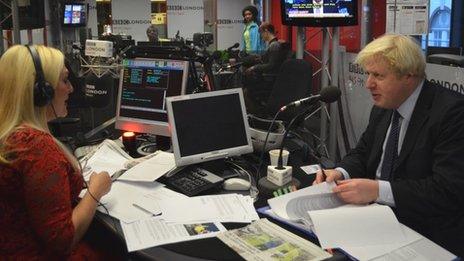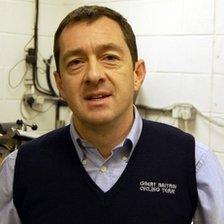London cycle deaths: Chris Boardman wants HGV ban
- Published

Boris Johnson says he is not convinced about a peak hours lorry ban
Former Olympic cyclist Chris Boardman has called on Boris Johnson to consider banning lorries from some of London's roads during peak times.
Following the death of six cyclists on London's roads in two weeks, Mr Boardman asked the mayor to honour a "promise" he made by looking at similar schemes in operation abroad.
He said: "The longer we delay, the more lives will be lost."
Mr Johnson told BBC London 94.9 he was not convinced by the argument.
Nine of this year's 14 cyclist fatalities and five of last year's 14 deaths involved a heavy goods vehicle.
In the centre of Paris, where there are restrictions on lorries, there were no cyclist fatalities in 2011, according to the Prefecture of Police of Paris.
'Do something'
Boardman, British Cycling's policy adviser, said in an open letter to the mayor: "When I rode alongside you to help you launch your vision for cycling in March this year, you made a verbal promise to look at the successful experiences of Paris and many other cities in restricting the movements of heavy vehicles during peak hours.

Chris Boardman said London had an "opportunity to do something now"
"London has an opportunity to emulate and surpass Paris and to lead the way for the other ambitious cycling cities across Britain.
"Let's not waste this opportunity to do something now."
The House of Commons Transport Committee is to hold an oral evidence session on cycle safety on 2 December to "stimulate debate", said chairman Louise Ellman.
Speaking to Vanessa Feltz on BBC London 94.9, the mayor of London said safety must be improved.
He said he was getting on with the programme to invest the "thick end of £1bn" to make cycling in the capital safer.
Mr Johnson said there had to be a "much bigger conversation about HGVs" and the dangers they pose when they turn left.
But he said imposing a peak-time ban risked damaging London companies and creating a "serious influx as soon as the ban is over".
He said that examples from other European cities were being studied, but that he was "by no means satisfied" the idea was the solution.
Headphones a 'scourge'
Mr Johnson said the latest person to die was in a collision with a lorry at about midday, not during the rush hour.
He added: "We are not dismissing any suggestion."
On new safety ideas being considered at Transport for London, he said the issue of people riding bikes and walking in the street using personal electronic devices was discussed frequently.
Mr Johnson said he thought headphones were an "absolute scourge" and that he would consider banning cyclists from wearing them.
"Call me illiberal, but it makes me absolutely terrified to see them bowling along unable to hear the traffic.
"You've got to be able to hear that car behind you or about to come out of the road in front of you," he said.
Mark Ames, editor of cycling blog ibikelondon, accused the mayor of taking attention away from his "inaction".
He wrote on Twitter that the mayor was "a clever man" who had "deflected all attention on his inaction and HGV ban and made a debate about Londoners wearing headphones".
'Add to congestion'
The House of Commons Transport Committee chairman Ms Ellman said the deaths of cyclists this year had raised the issue of restricting lorries, and the behaviour of drivers and cyclists.
Boris Johnson told BBC London he remains unconvinced by a ban
She said: "Many of these casualties involve large vehicles, especially HGVs, and there is now debate about whether they should be banned from city centres at peak times.
"This will have consequences for businesses, which need to be assessed."
Kate Gibbs, spokeswoman for the Road Haulage Association, said: "Lorries have to get in and out of construction sites. Shops have to have goods on their shelves. Even Halfords."
She said restricting lorries from entering the city between 10:00 and 18:00, for example, "would add to the congestion that London roads are already facing".
During the Olympics, deliveries were made to shops and businesses overnight with the usual restrictions preventing noise for residents removed.
But Ms Gibbs said that was not a "workable solution".
- Published19 November 2013
- Published18 November 2013
- Published19 November 2013
- Published17 November 2013
- Published14 November 2013
- Published14 November 2013
- Published13 November 2013
- Published13 November 2013
- Published2 June 2011